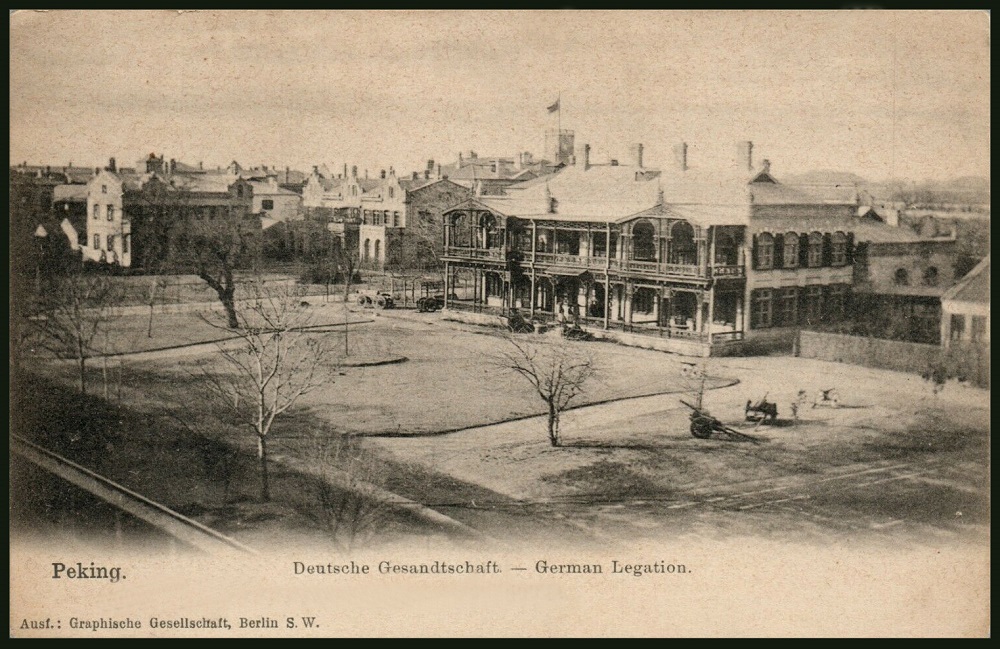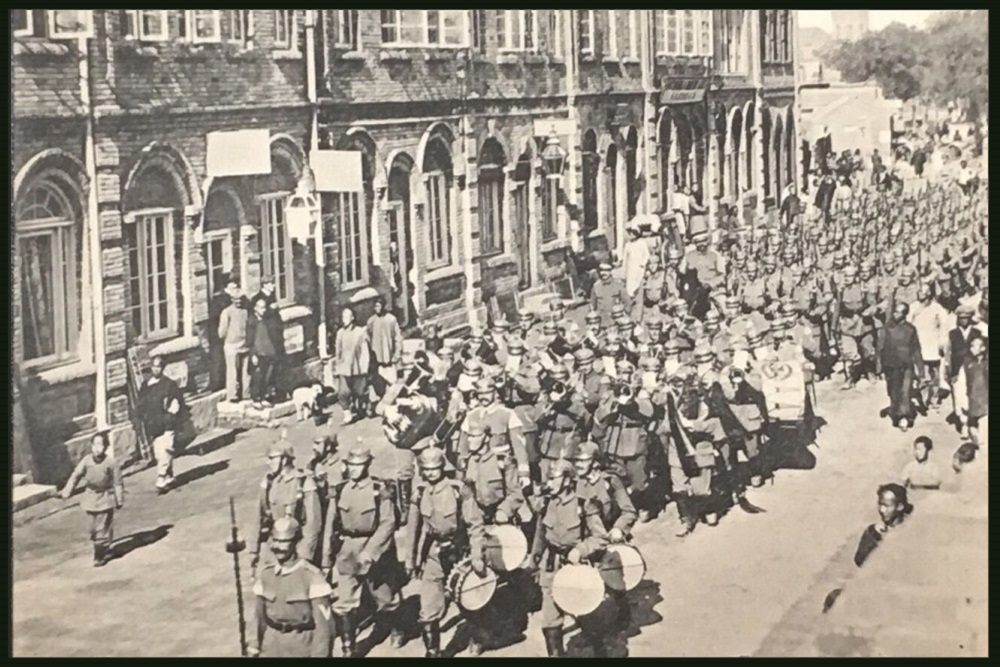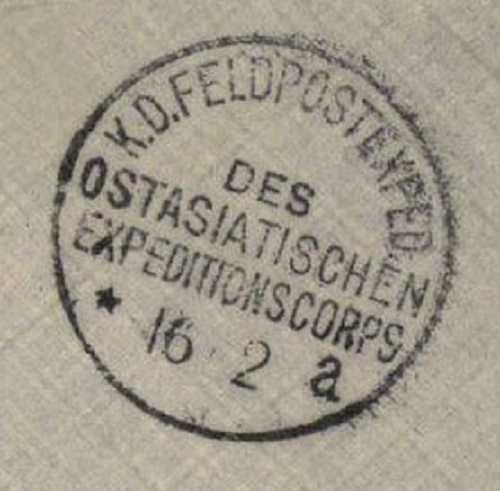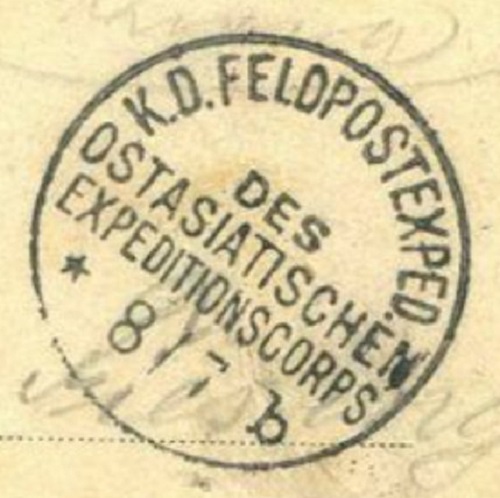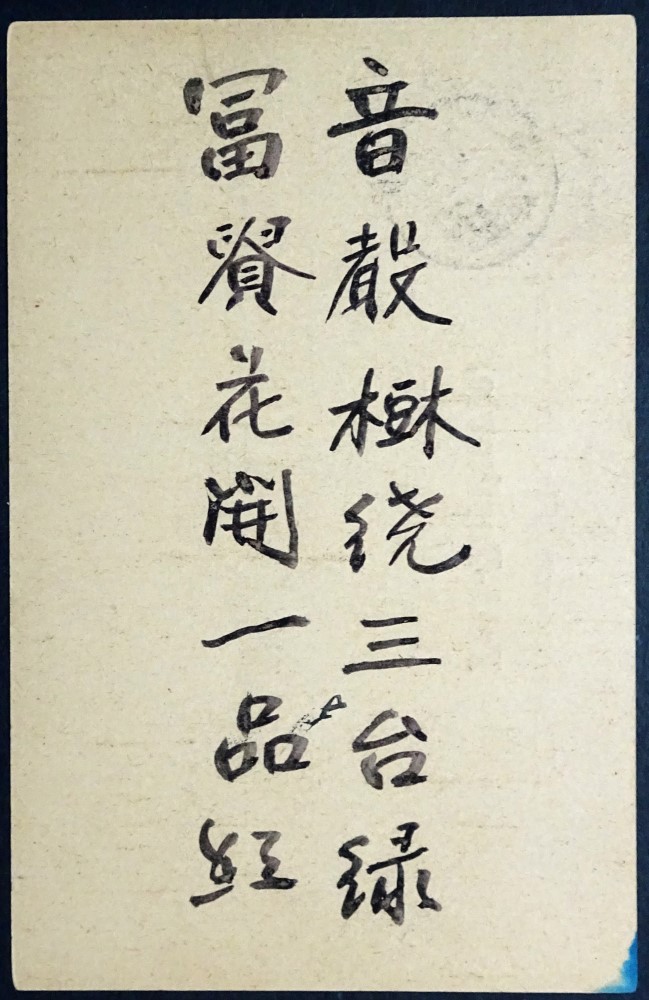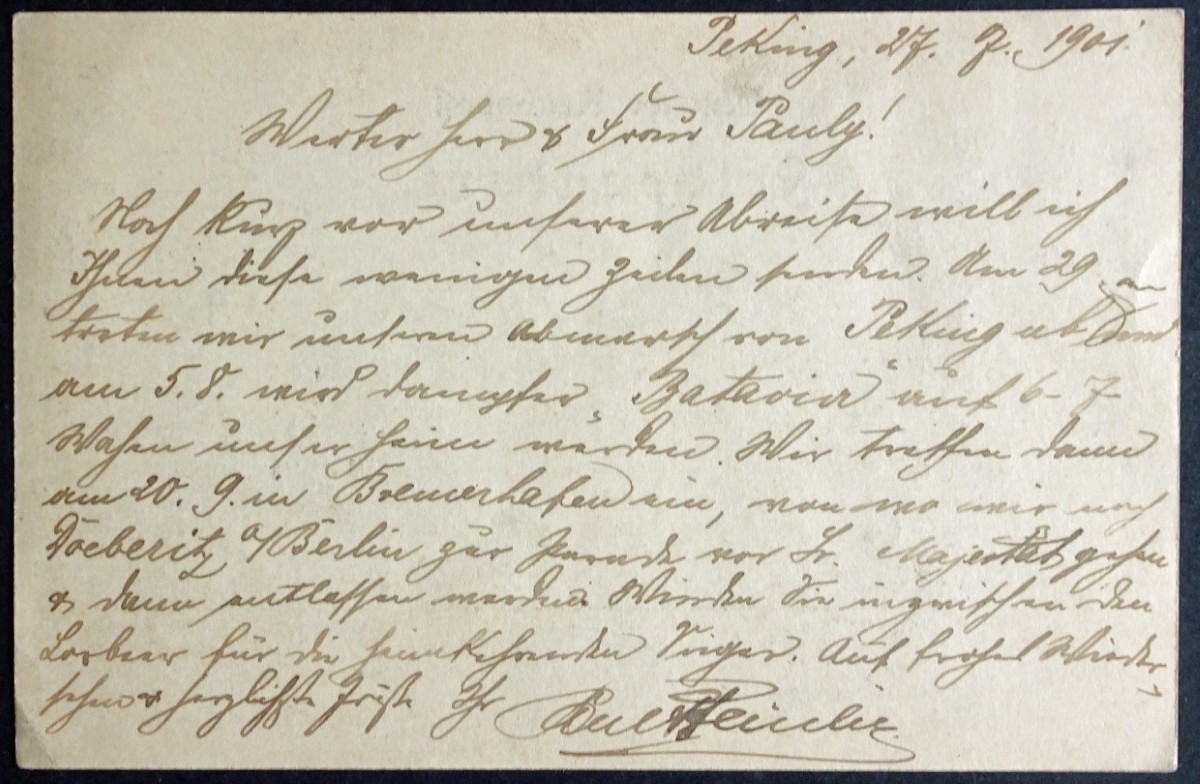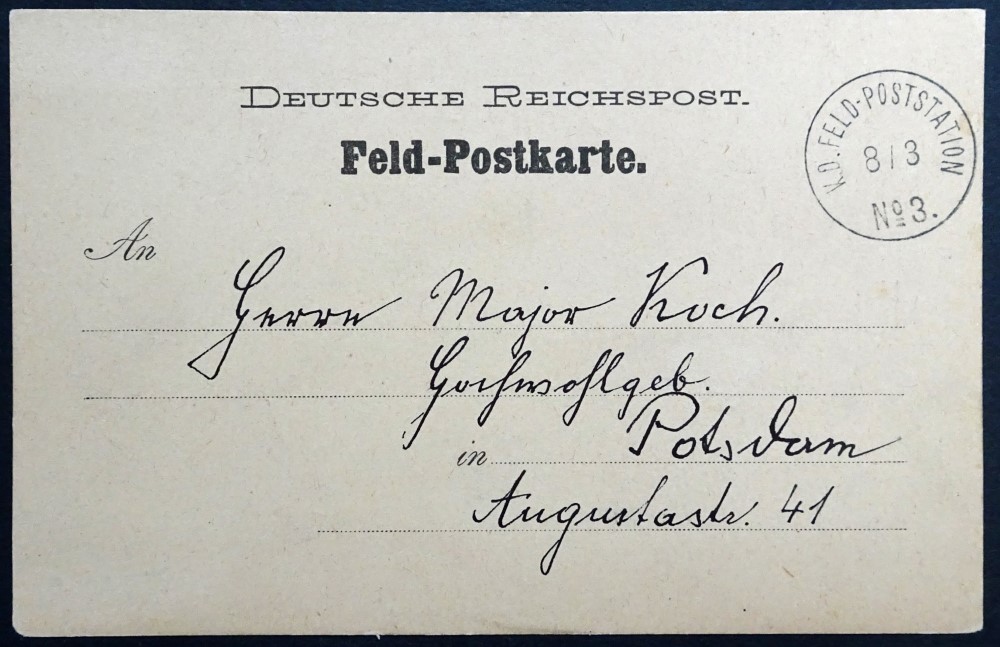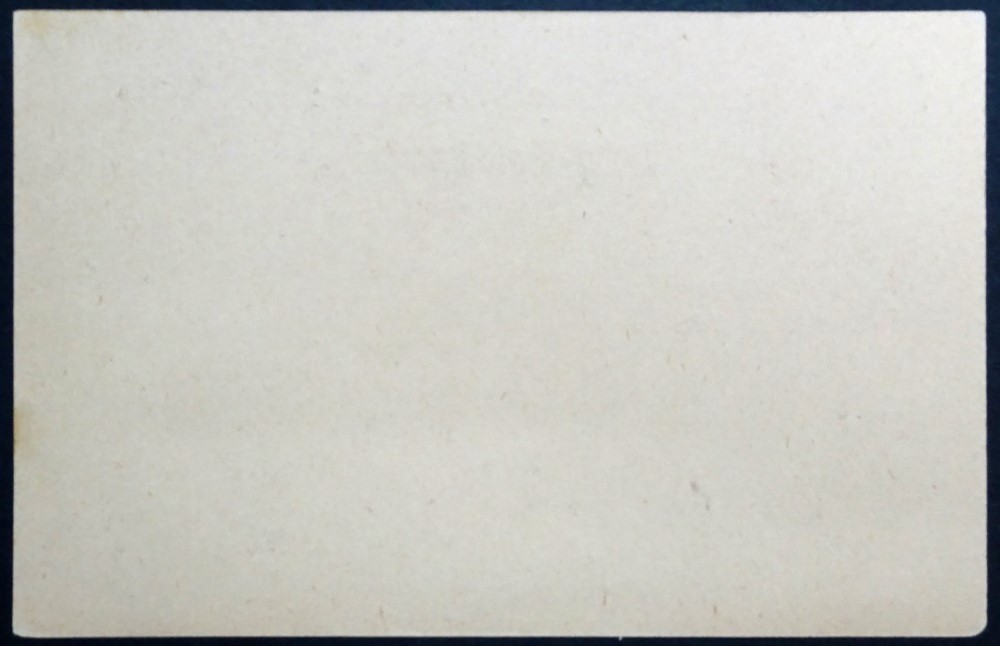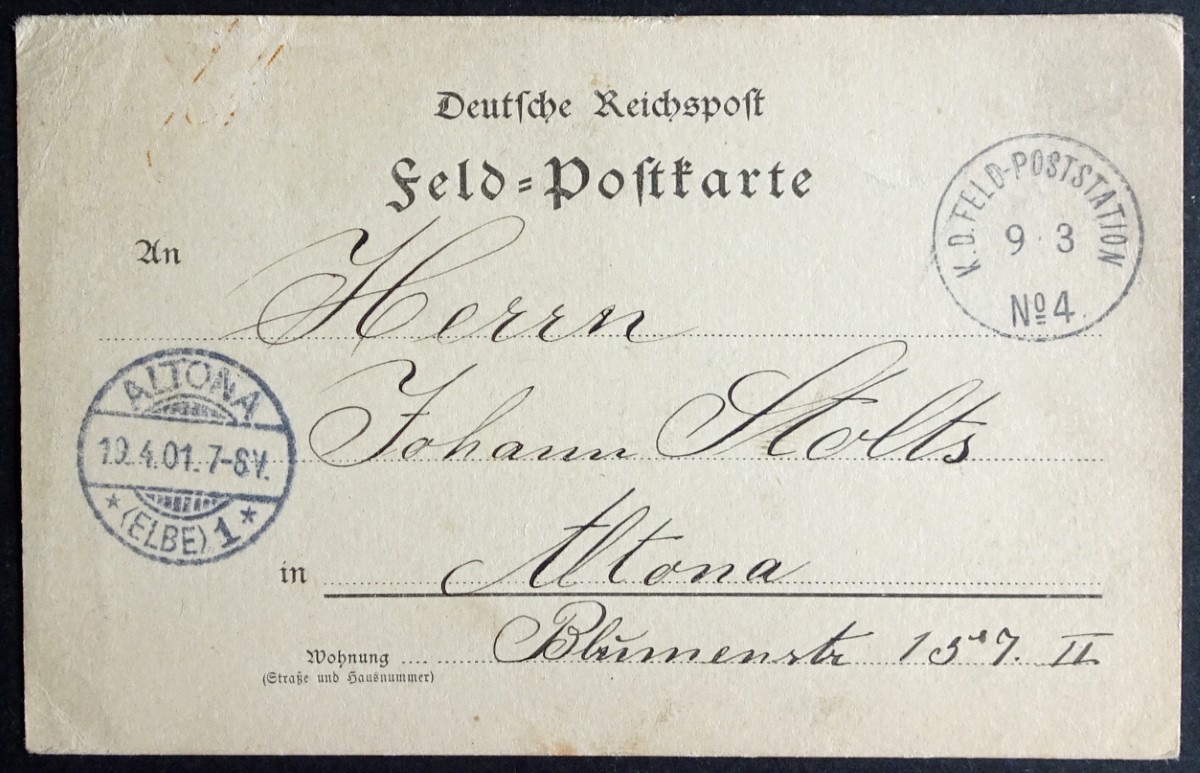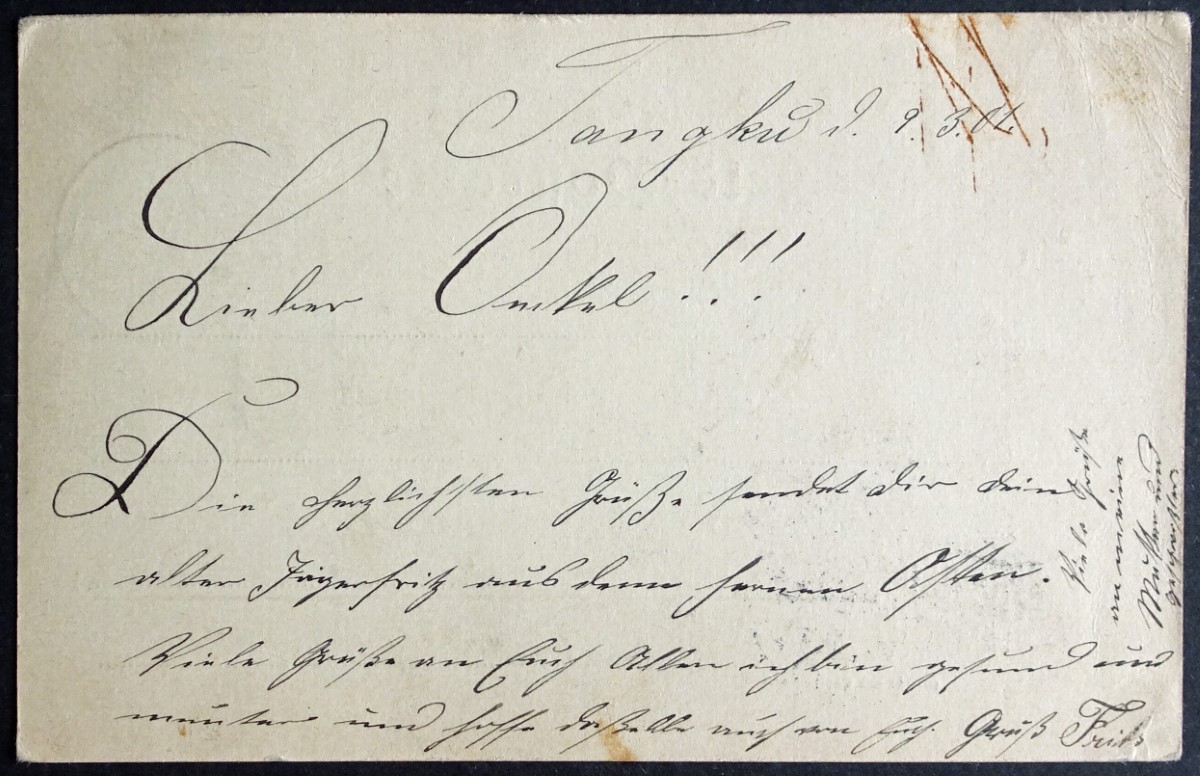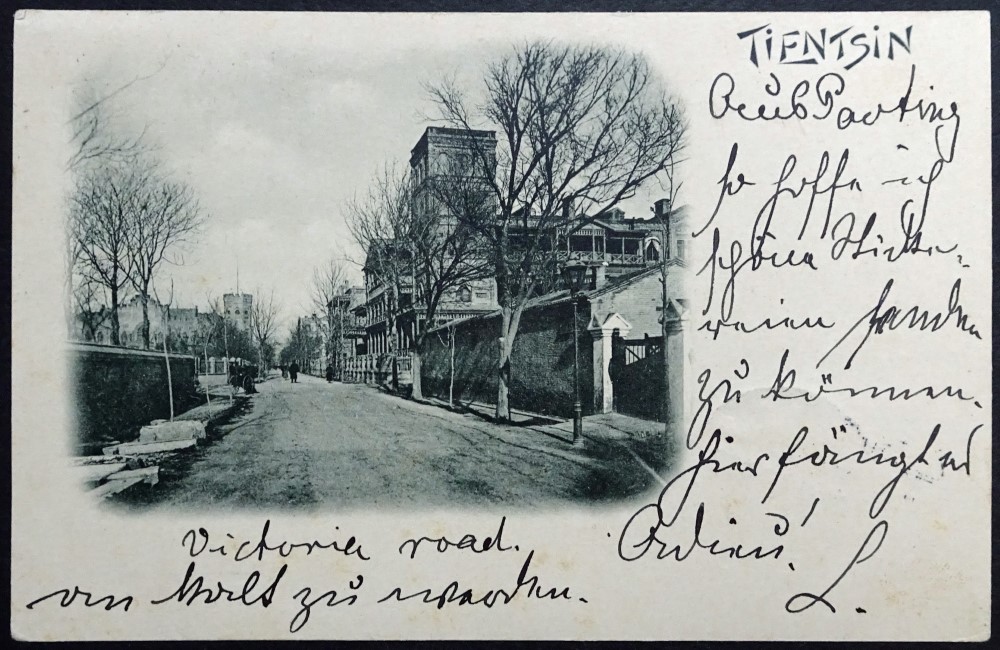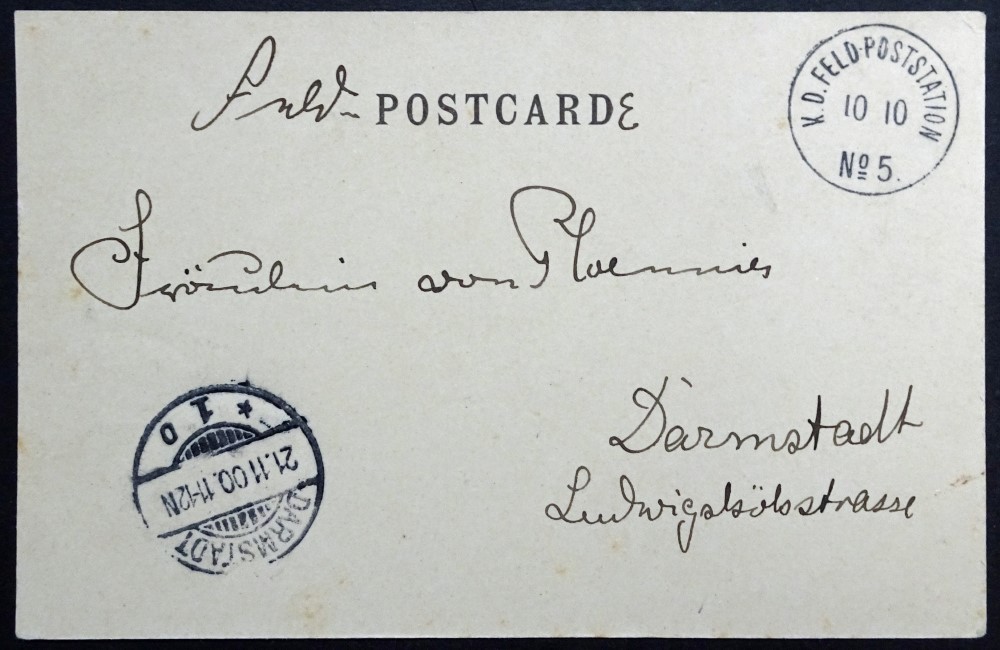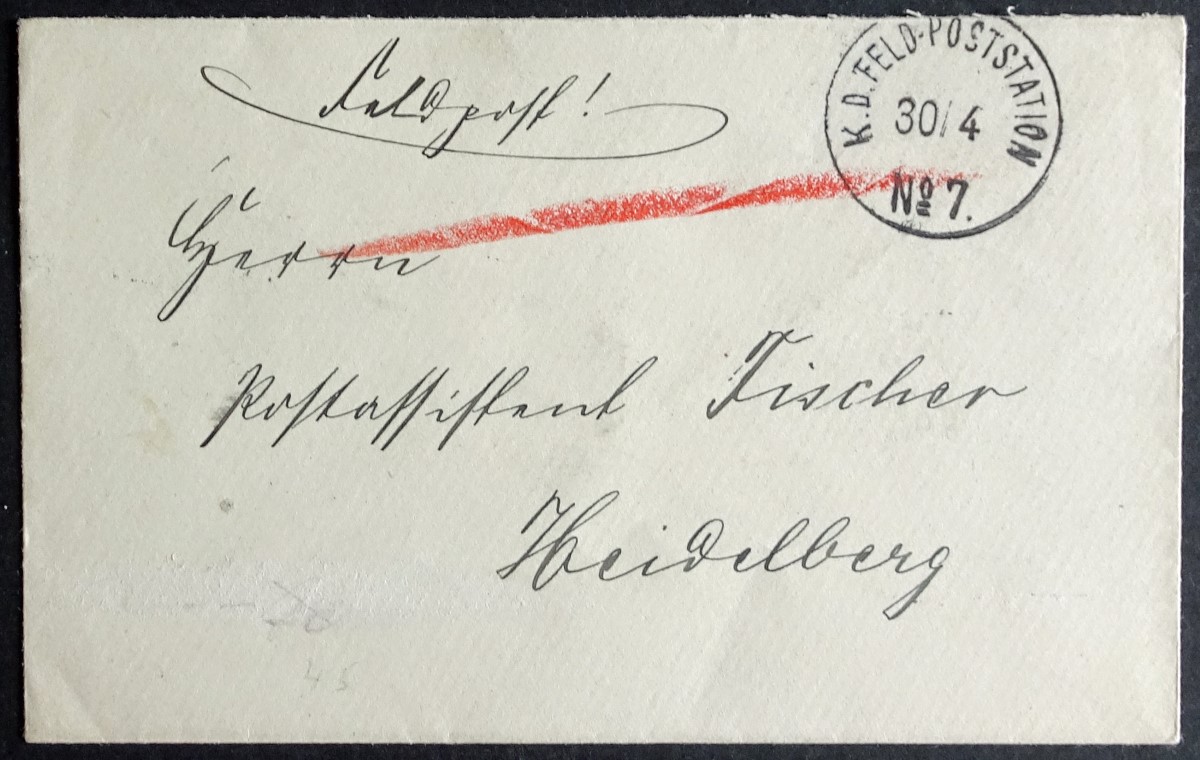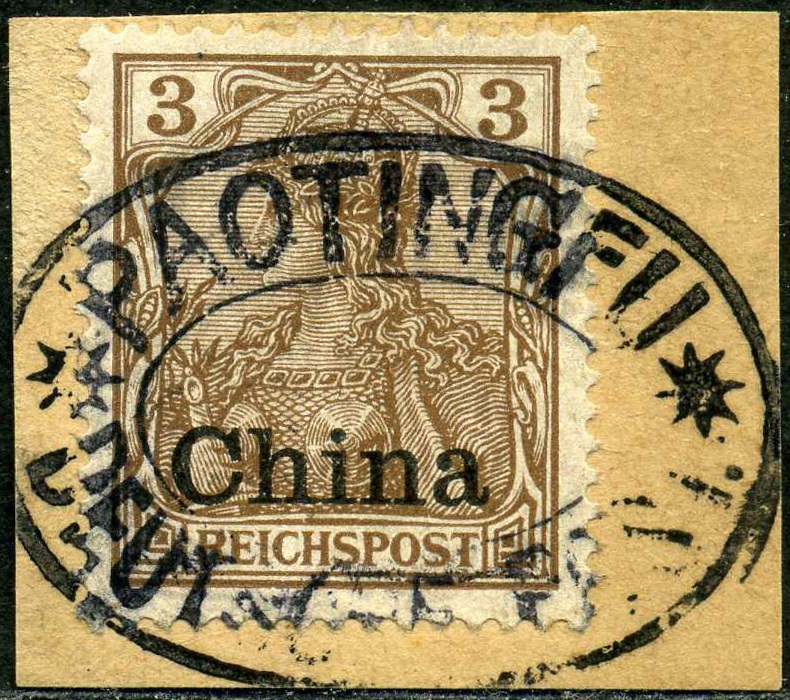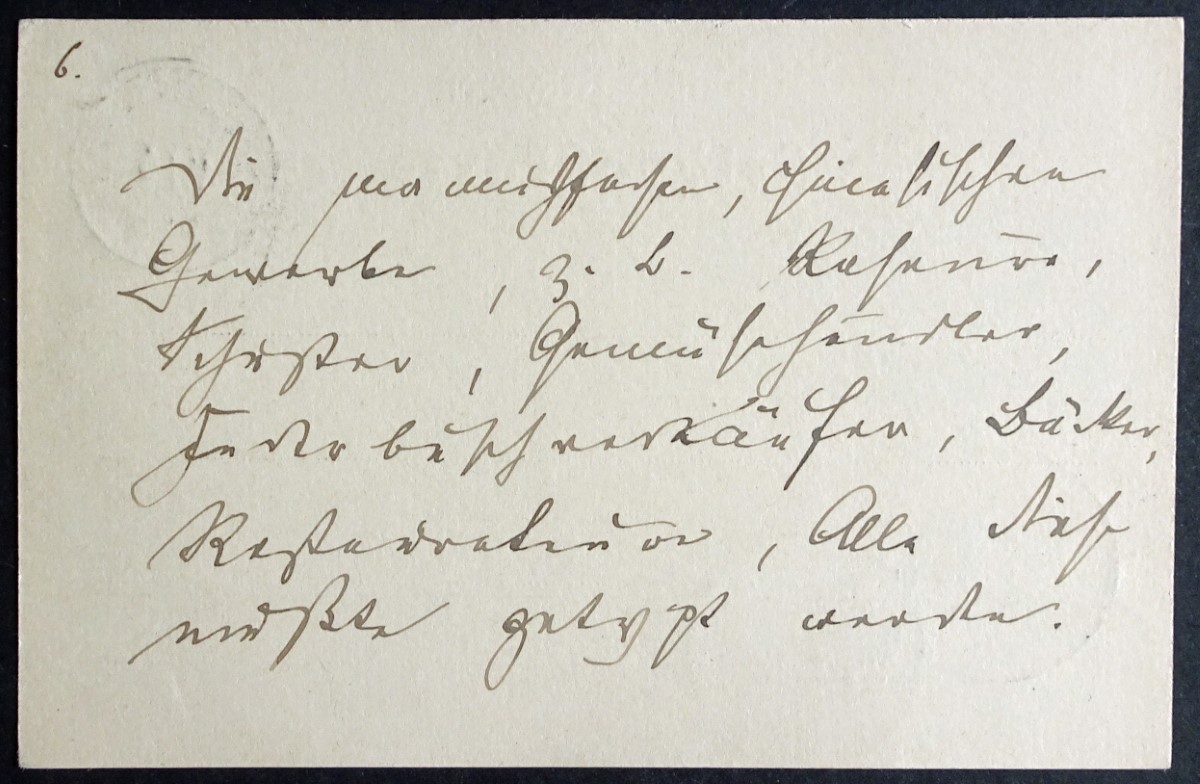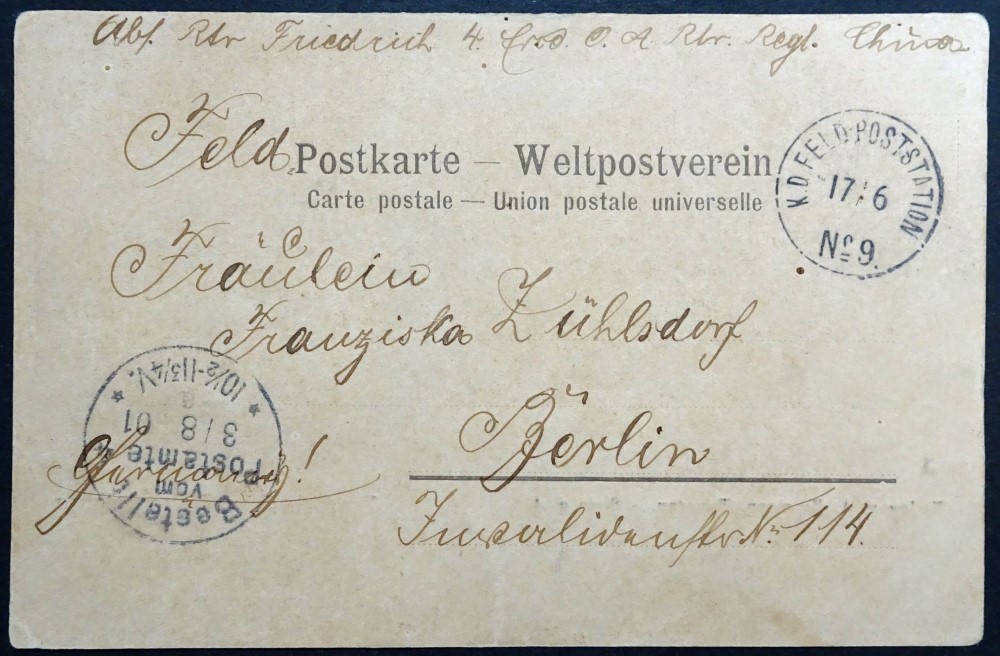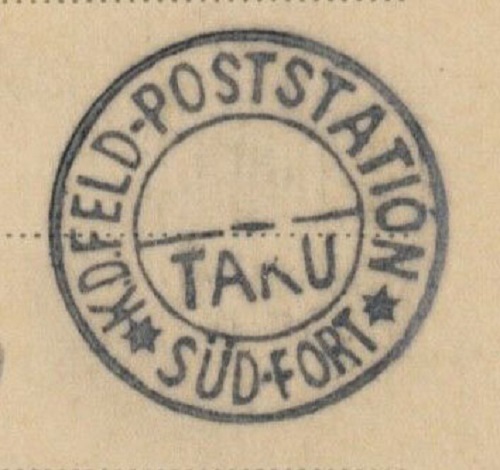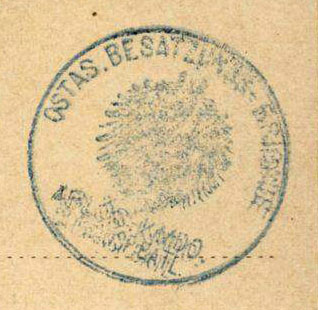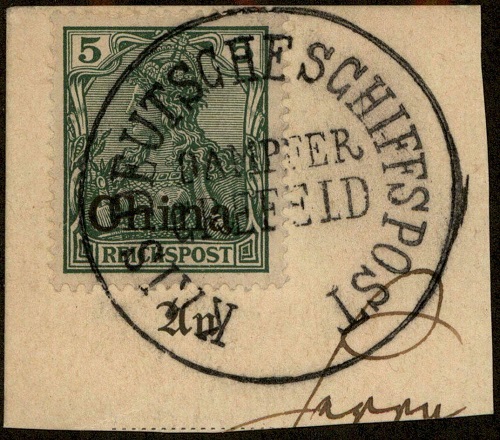GERMAN POST OFFICES ABROAD
CHINA
FELDPOST

BOXER REBELLION
FELDPOST
The Boxer rebellion was an uprising by members of the 'Yihequan' (“Righteous and Harmonious Fists”), a semi-religious sect who were against western imperialism throughout regions of China but mainly in the north East of the country. Hostilities are generally considered to have started with the murder of missionaries and Chinese Christians in Paotingfu in May 1900 and concluded with the signing of the peace treaty on 7th Sep 1901.
The rebellion was put down by an alliance of eight countries including Britain, France, Russia, Germany, Japan, the United States, Italy and the Austro-Hungarian empire. The German forces arrived too late to take part in much of the fighting during the rebellion but they did gain a reputation for brutality in murdering Chinese civilians after the uprising. The majority of German forces had withdrawn by the middle of June 1901.
Quick Links: Peking Legation, Tientsin Legation Guard, Feldpost Prior to 'Feldpostexpedition', Tongku Vorlaufer, East Asiatic Expeditionary Corps, Feldpost 1, Feldpost 2, Feldpost 3, Feldpost 4, Feldpost 5, Feldpost 6, Feldpost 7, Feldpost 8, Feldpost 9, Feldpost 10, Sud-Fort, Bahnpost, Navy Ship Mail, Marine Shiffspost, OSTAS. BESATZUNGS-BRIGADE, Hospital Mail, Yokohama Mail, Return of Troops to Germany, Miscellaneous, References
Feldpost was free to active German soldiers in China from 13th Jul 1900 until 31st Aug 1901, for mail up to 50 grams. For mail of 50 to 250 grams there was a charge of 20Pf. For Navy personnel Feldpost was free from 31st Aug 1900 until 31st Aug 1901 and there was a charge of 10Pf for mail between 50 and 60 grams. For military personnel still in transit from China to Germany, post remained free after 31st Aug 1901 until disembarkation in Germany.

MAIL from the LEGATION GUARDS
1898 / 1899
Mail sent by the 3rd Marine Battalion in Tsingtau attached to the guards at Peking and Tientsin legations in 1898 to 1899 during the initial stages of the Boxer Rebellion.
LEGATION GUARD in PEKING
Back to Top
German Legation Peking c1900
German Troops in Peking c1900
During the Boxer Rebellion in 1900, the Legation Quarter (Embassy Region) was besieged by Boxers and the Qing army. The seige lasted for 55 days until 14th Aug when it was relieved by a multi-national army, the Eight-Nation Alliance, which marched to Beijing from the coast and defeated the Chinese army in a series of battles, including the Battle of Peking. Of the 900 foreign nationals, including 400 soldiers, who took refuge in the Legation Quarter, 55 soldiers and 13 civilians were killed. Beijing was occupied for more than one year by the foreign armies



Only recognisable by the senders endorsement
LEGATION GUARD in TIENTSIN
Back to Top
German Legation Tientsin c1910
German Troops Marching through the streets of Tientsin c1900
The Battle of Tientsin, or the Relief of Tientsin, occurred on the 13th and 14th Jul 1900, during the Boxer Rebellion in Northern China. A multinational military force, representing the Eight-Nation Alliance, rescued a besieged population of foreign nationals in the city of Tientsin by defeating the Chinese Imperial army and Boxers. The capture of Tientsin gave the Eight-Nation Alliance a base to launch a rescue mission for the foreign nationals besieged in the Legation Quarter of Peking and to capture the city in the Battle of Peking (1900).



Only recognisable by the senders endorsement

Feldpost Prior to 'Feldpostexpedition'
of the East Asiatic Expeditionary Corps
POSTMARKS APPLIED IN TIENTSIN
Back to Top
There were three handstamps used in June 1900 for the cancellation of military mail.


(1)
'Marinebrief | Abs Marinedetachement'
Two line hand written endorsement in red ink
'Marinebrief | Abs Marinedetachement'
Two line hand written endorsement in red ink
(2)
'MARINEBRIEF | ABSENDER MARINE DETACHEMENT'
Two line cancellation in blue or violet ink
'MARINEBRIEF | ABSENDER MARINE DETACHEMENT'
Two line cancellation in blue or violet ink
(3)
'FELDPOSTBRIEF'
used by the landing forces from 27th Jun to end Jul 1900
'FELDPOSTBRIEF'
used by the landing forces from 27th Jun to end Jul 1900
POSTMARKS APPLIED AT TONGKU
VORLAUFER CANCEL
Back to Top
There were three, almost identical, handstamps used between 9th Aug and 2nd Sep 1900 for the cancellation of military mail in Tongku. Because Tongku was the main port of arrival for German troops landing in China, a feldpost office was established on 9th Aug 1900. Three cancels, each carved in wood were created to frank the mail and these cancels are referred to as 'Wagon wheel' cancels. Although almost identical there are subtle differences between the three cancels (see below).(1)
'KAISERLICH DEUTSCHE FELDPOST CHINA 1900'
(Type I)
narrow spacing between 'CHINA' and 'FELDPOST'.
'KAISERLICH DEUTSCHE FELDPOST CHINA 1900'
(Type I)
narrow spacing between 'CHINA' and 'FELDPOST'.
(2)
'KAISERLICH DEUTSCHE FELDPOST CHINA 1900'
(Type II)
narrow spacing between 'S' in 'DEUTSCHE' and the neighbouring letters.
'KAISERLICH DEUTSCHE FELDPOST CHINA 1900'
(Type II)
narrow spacing between 'S' in 'DEUTSCHE' and the neighbouring letters.
(3)
'KAISERLICH DEUTSCHE FELDPOST CHINA 1900'
(Type III)
'1900' wider spacing to the 'K' in 'KAISERLICH'
'KAISERLICH DEUTSCHE FELDPOST CHINA 1900'
(Type III)
'1900' wider spacing to the 'K' in 'KAISERLICH'
Cancels (1) to (3) were used from 9th Aug to 2nd Sep 1900 and are only found on Chinese stamps (Michel 1 to 6) and German Empire stamps Michel 46 to 48 and Michel 55 to 57.
Due to their wooden construction, Cancel 1 deteriorated quickly, so genuine examples are usually smeared and unclear. Cancels 2 and 3 are thought to have been mainly used as favour cancels (back-dated examples are common) and so have much cleaner and sharper images. Examples of covers with dates after 14th Oct 1900 are considered to be philatelic creations rather than genuine mail.
EAST ASIATIC EXPEDITIONARY CORPS
FELDPOST
(from 1st Sep 1900)
FELDPOST EXPEDITION
TIENTSIN
Back to Top
German Troops taking a break c1900
There were four, similar handstamps from 1st Sep 1900 for the cancellation of military mail in Tientsin.
(1)
'KAIS.DEUTSCHE | FELDPOST-EXPEDITION a'
commercial use not verified
'KAIS.DEUTSCHE | FELDPOST-EXPEDITION a'
commercial use not verified
(2)
'KAIS.DEUTSCHE | FELDPOST-EXPEDITION b'
'KAIS.DEUTSCHE | FELDPOST-EXPEDITION b'
(3)
'K.D.FELDPOSTEXPED | DES | OSTASIATISCHEN | EXPEDITIONSCORPS | a'
'K.D.FELDPOSTEXPED | DES | OSTASIATISCHEN | EXPEDITIONSCORPS | a'
(4)
'K.D.FELDPOSTEXPED | DES | OSTASIATISCHEN | EXPEDITIONSCORPS | b'
'K.D.FELDPOSTEXPED | DES | OSTASIATISCHEN | EXPEDITIONSCORPS | b'
(1) has not been verified on commercial covers.
(2) on postage on the 7th and 8th Nov 1900, but most examples are on the 7th. Dates after this are thought to be favour cancels.
(3) 18th Oct 1900 through to 31st Aug 1901.
(4) 18th Oct 1900 through to 31st Aug 1901.
(3) and (4) are commonly accompanied by an additional violet "FELDPOSTBRIEF" rectangular handstamp, of which there are 3 possible versions.
K.D. FELD-POST STATION No.1
KAUMI (KIAUTSCHOU)
Back to Top
K.D. FELD-POST STATION No.1 cancels were used in KIAUTSCHOU from 23rd Nov 1900 to 4th Jul 1901.
K.D. FELD-POST STATION No.2
PEKING
Back to Top
K.D. FELD-POST STATION No.2 cancels were used in PEKING from 9th Nov 1900 to 31st Aug 1901.Feldpost No. 2

K.D. FELD-POST STATION No.3
YANGTSUN
Back to Top
K.D. FELD-POST STATION No.3 cancels were used in YANGTSUN from 2nd Sep 1900 to 30th Apr 1901. Feldpost No.3

K.D. FELD-POST STATION No.4
TONGKU
Back to Top
K.D. FELD-POST STATION No.4 cancels were used in TONGKU from 2nd Sep 1900 to 31st Aug 1901.Feldpost No.4

K.D. FELD-POST STATION No.5
TIENTSIN
Back to Top
Feldpost No.5

K.D. FELD-POST STATION No.6
TINGTSCHOU, FUPING & LUNGTSÜANKWAN
Back to Top
K.D. FELD-POST STATION No.6 cancels were used in TINGTSCHOU, FUPING & LUNGTSÜANKWAN from 18th Apr to Jun (Jul in Fuping) 1901.


K.D. FELD-POST STATION No.7
PAOTINGFU
Back to Top
K.D. FELD-POST STATION No.7 cancels were used in PAOTINGFU from 20th Nov 1900 to 25th Jul 1901. There is sometimes an oval attendant handstamp inscribed "PAOTINGFU | DEUTSCHE POST" that is considered to be philatelically inspired. This may also have a handwritten date or a separate handstamp.There is an oval shaped attendant postmark inscribed 'PAOTINGFU | DEUTSCHE POST' which is shown below and is considered to be a philatelic creation, It is usually accompanied by a handwritten date or separate handstamp.
'PAOTINGFU | DEUTSCHE POST'
Philatelically inspired
Philatelically inspired

K.D. FELD-POST STATION No.8
SHANHAIKUAN
Back to Top
K.D. FELD-POST STATION No.8 cancels were used in SHANHAIKUAN from 27th Nov 1900 to 31st Aug 1901. There is also a round "SHANHAIKUAN | DEUTSCHE POST" attendant handstamp from 26th Nov 1900 which may predate the 'FP 8' cancel but it is also known to have been used as an attendant stamp from 27th Nov 1900 to 31st Aug 1901. Feldpost No.8

K.D. FELD-POST STATION No.9
PEITHAIHO
Back to Top
K.D. FELD-POST STATION No.9 cancels were used in PEITHAIHO from 22nd May to 31st Aug 1901. Feldpost No.9

K.D. FELD-POST STATION No.10
KAIPING
Back to Top
K.D. FELD-POST STATION No.10 cancels were used in KAIPING from 21st May to 31st Aug 1901.


K.D. FELD-POST STATION SUD-FORT
Back to Top
K.D. FELD-POST STATION SUD-FORT cancels were used in TAKU probably from Sep until 26th Nov 1900 with arrival in Germany up until 6th Jan 1901. This cancel is always struck at least twice on commercial mail and can also be found as a favour cancel after 6th Jan 1901.
KAISERLICH-DEUTSCHE-BAHNPOST
PEKING TAKU
Back to Top
"KAISERLICH-DEUTSCHE-BAHNPOST | PEKING TAKU" cancels were used on trains using the Peking to Taku line from 17th Oct 1900 until 25th Mar 1901. They are found on field telegrams and also as favour cancels.(1)
KAISERLICH-DEUTSCHE-BAHNPOST | PEKING TAKU
KAISERLICH-DEUTSCHE-BAHNPOST | PEKING TAKU
(2)
KAISERLICH-DEUTSCHE-BAHNPOST | PEKING TAKU
KAISERLICH-DEUTSCHE-BAHNPOST | PEKING TAKU
(2) not known for commercial use.

SUPPLEMENTARY MARKINGS
Back to Top
'Feldpostbrief' and 'FELDPOSTBRIEF' supplementary markings can be found in violet rectangle frames. 'Feldpostbrief' originating from the naval post office in Berlin from Jul 1900 and 'FELDPOSTBRIEF' originating from Shanghai effective Aug 1900 and on navy ships. Finally there is a 'Peking Kaiserpalast' handstamp that exists in various styles and colours.


'Feldpostbrief'
'FELDPOSTBRIEF'
'Peking Kaiserpalast'

NAVY SHIP MAIL
KAIS DEUTSCHE
MARINE SHIFFSPOST No. X
Ships without onboard postal services
Back to Top
"KAIS DEUTSCHE MARINE SHIFFSPOST No. X" cancels were used on ships docked in ports in China during the Boxer Rebellion period from 1900 and 1901. There were 19 different numbers used on these cancels (Troop Transport ships that had their own postal services on board are listed after this section).


No. 3
SMS Luchs
(Gunboat)
31st Aug 1900 to 31st Aug 1901
SMS Luchs
(Gunboat)
31st Aug 1900 to 31st Aug 1901
No. 4
SMS Irene
(Small Cruiser)
31st Aug 1900 to 22nd Sep 1901
SMS Irene
(Small Cruiser)
31st Aug 1900 to 22nd Sep 1901
No. 11
SMS Seeadler
(Small Cruiser)
31st Aug 1900 to 31st Aug 1901
SMS Seeadler
(Small Cruiser)
31st Aug 1900 to 31st Aug 1901
No. 17
SMS Schwalbe
(Small Cruiser)
31st Aug 1900 to 31st Aug 1901
SMS Schwalbe
(Small Cruiser)
31st Aug 1900 to 31st Aug 1901
No. 20
SMS Iltis
(Gunboat)
31st Aug 1900 to 31st Aug 1901
SMS Iltis
(Gunboat)
31st Aug 1900 to 31st Aug 1901
No. 23
SMS Wörth
(Battleship)
31st Aug 1900 to 31st Aug 1901
SMS Wörth
(Battleship)
31st Aug 1900 to 31st Aug 1901
No. 31
SMS Brandenburg
(Small Cruiser)
31st Aug 1900 to 31st Aug 1901
SMS Brandenburg
(Small Cruiser)
31st Aug 1900 to 31st Aug 1901
No. 34
SMS Kürfurst Friedrich-Wilhelm
(Battleship)
31st Aug 1900 to 31st Aug 1901
SMS Kürfurst Friedrich-Wilhelm
(Battleship)
31st Aug 1900 to 31st Aug 1901
No. 35
SMS Weissenburg
(Battleship)
31st Aug 1900 to 31st Aug 1901
SMS Weissenburg
(Battleship)
31st Aug 1900 to 31st Aug 1901
No. 36
SMS Geier
(Small Cruiser)
31st Aug 1900 to 31st Aug 1901
SMS Geier
(Small Cruiser)
31st Aug 1900 to 31st Aug 1901
No. 38
SMS Gefion
(Small Cruiser)
31st Aug 1900 to 31st Aug 1901
SMS Gefion
(Small Cruiser)
31st Aug 1900 to 31st Aug 1901
No. 39
SMS Hertha
(Large Cruiser)
31st Aug 1900 to 31st Aug 1901
SMS Hertha
(Large Cruiser)
31st Aug 1900 to 31st Aug 1901
No. 42
SMS Hela
(Small Cruiser)
31st Aug 1900 to 31st Aug 1901
SMS Hela
(Small Cruiser)
31st Aug 1900 to 31st Aug 1901
No. 43
SMS Fürst Bismarck
(Large Cruiser)
31st Aug 1900 to 31st Aug 1901
SMS Fürst Bismarck
(Large Cruiser)
31st Aug 1900 to 31st Aug 1901
No. 44
SMS Tiger
(Gunboat)
31st Aug 1900 to 31st Aug 1901
SMS Tiger
(Gunboat)
31st Aug 1900 to 31st Aug 1901
No. 45
SMS Jaguar
(Gunboat)
31st Aug 1900 to 31st Aug 1901
SMS Jaguar
(Gunboat)
31st Aug 1900 to 31st Aug 1901
No. 51
SMS Bussard
(Small Cruiser)
31st Aug 1900 to 31st Aug 1901
SMS Bussard
(Small Cruiser)
31st Aug 1900 to 31st Aug 1901
KAIS DEUTSCHE
MARINE SHIFFSPOST No. X
Feld-post of Troop Transport Ships
Back to Top
From 11th Jun 1900 the embassy in Peking, where foreign missionaries and Chinese Christians were sheltering and was protected by 350 armed guards, was surrounded and continuously attacked by the Boxers. This led to a force of 2,040 men from 6 nations being despatched from Tientsin to Peking in an effort to relieve the embassy. This force was repulsed by the Boxers before it could reach Peking.The situation continued to deteriorate and led to the despatch of several warships to East Asia from Germany, Honolulu, Daressalam and Apia between 30th Jun and 30th Jul 1900. A German Marine Expeditionary Corps consisting of a total of 2,500 men and attached to the First and Second Sea Battalions, departed Wilhelshaven on 2nd Jul 1900 aboard two German transport ships, the Frankfurt and the Wittekind. The force arrived at Taku on 15th Aug 1900 and immediately transferred to Peking to relieve the commandos defending the embassy.
"KAIS DEUTSCHE MARINE SHIFFSPOST No. X" cancels were used on the following ships during this period. These cancels have the same design as the Shiffspost cancels above.
Outward Voyage of the Navy Expeditionary Force
(Wilhelmshaven to Taku)
No. 2
Wittekind
(Chartered Civil Ship)
3rd Jul 1900 to 24th Aug 1900
Wittekind
(Chartered Civil Ship)
3rd Jul 1900 to 24th Aug 1900
No. 26
Frankfurt
(Chartered Civil Ship)
3rd Jul 1900 to 19th Dec 1900
Frankfurt
(Chartered Civil Ship)
3rd Jul 1900 to 19th Dec 1900
First Transport Fleet of the
East Asiatic Expeditionary Corps
(Bremerhaven to Taku)
Back to Top
On 9th July the first German East Asia Expeditionary Corps was created consisting of 577 officers and 11,213 men. Under the name of 'First Transport Detachment', the force left Bremerhaven on 10 chartered ships from 27th Jul to 4th Aug 1900 arriving in Taku from 10th Sep 1900.No. 25
Halle
(Chartered Civil Ship)
27th Jul 1900 to 5th Dec 1900
Halle
(Chartered Civil Ship)
27th Jul 1900 to 5th Dec 1900
No. 27
Dresden
(Chartered Civil Ship)
27th Jul 1900 to 26th Nov 1900
Dresden
(Chartered Civil Ship)
27th Jul 1900 to 26th Nov 1900
No. 28
Batavia
(Chartered Civil Ship)
27th Jul 1900 to 10th Sep 1900
Batavia
(Chartered Civil Ship)
27th Jul 1900 to 10th Sep 1900
No. 30
Sardinia
(Chartered Civil Ship)
30th Jul 1900 to Nov 1900
Sardinia
(Chartered Civil Ship)
30th Jul 1900 to Nov 1900
No. 48
Aachen
(Chartered Civil Ship)
31st Jul 1900 to 19th Oct 1900
Aachen
(Chartered Civil Ship)
31st Jul 1900 to 19th Oct 1900
No. 49
Strassburg
(Chartered Civil Ship)
31st Jul 1900 to 5th Dec 1900
Strassburg
(Chartered Civil Ship)
31st Jul 1900 to 5th Dec 1900
No. 52
Adria
(Chartered Civil Ship)
2nd Aug 1900 to 22nd Oct 1900
Adria
(Chartered Civil Ship)
2nd Aug 1900 to 22nd Oct 1900
No. 53
Phönicia
(Chartered Civil Ship)
4th Aug 1900 to 20th Oct 1900
Phönicia
(Chartered Civil Ship)
4th Aug 1900 to 20th Oct 1900
No. 64
H.H. Meyer
(Chartered Civil Ship)
4th Aug 1900 to 18th Oct 1900
H.H. Meyer
(Chartered Civil Ship)
4th Aug 1900 to 18th Oct 1900
Second Transport Fleet of the
East Asiatic Expeditionary Corps
(Bremerhaven to Taku)
Back to Top
A Second East Asia Expeditionary Corps consisting of 289 officers and 7,585 men, was raised on 12th Aug 1900 and proceeded from 31st Aug 1900 on 8 chartered civilian ships to Taku where it arrived from 10th Oct 1900. The expeditionary forces then spent the next few months quelling the uprising. From 10 June through to Sep 1900 the Germans started to return home although a small force did remain until 1906.No. 65
Andalusia
(Chartered Civil Ship)
31st Aug 1900 to Nov 1900
Andalusia
(Chartered Civil Ship)
31st Aug 1900 to Nov 1900
No. 66
Palatia
(Chartered Civil Ship)
31st Aug 1900 to 16th Oct 1900
Palatia
(Chartered Civil Ship)
31st Aug 1900 to 16th Oct 1900
No. 67
Darmstadt
(Chartered Civil Ship)
31st Aug 1900 to 10th Oct 1900
Darmstadt
(Chartered Civil Ship)
31st Aug 1900 to 10th Oct 1900
No. 68
Arcadia
(Chartered Civil Ship)
4th Sep 1900 to 29th Oct 1900
Arcadia
(Chartered Civil Ship)
4th Sep 1900 to 29th Oct 1900
No. 69
Roland
(Chartered Civil Ship)
7th Sep 1900 to Nov 1900
Roland
(Chartered Civil Ship)
7th Sep 1900 to Nov 1900
No. 72
Crefeld
(Chartered Civil Ship)
7th Sep 1900 to 11th Sep 1901
Crefeld
(Chartered Civil Ship)
7th Sep 1900 to 11th Sep 1901
Replacement Troops in East Asia
Back to Top
No. 26
H.H. Meyer
(Chartered Civil Ship)
19th Jan 1901 to 6th Mar 1901
H.H. Meyer
(Chartered Civil Ship)
19th Jan 1901 to 6th Mar 1901
No. 26
Rhein
(Chartered Civil Ship)
5th May 1900 to 28th Jun 1900
Rhein
(Chartered Civil Ship)
5th May 1900 to 28th Jun 1900
No. 29
Andalusia
(Chartered Civil Ship)
7th Mar 1901 to 30th Apr 1901
Andalusia
(Chartered Civil Ship)
7th Mar 1901 to 30th Apr 1901
No. 48
Bahia
(Chartered Civil Ship)
15th Jul 1901 to 25th Aug 1901
Bahia
(Chartered Civil Ship)
15th Jul 1901 to 25th Aug 1901

OSTAS. BESATZUNGS-BRIGADE
ABLÖS.KMDO. 2.
TRANSP. BATL
Back to Top
"OSTAS. BESATZUNGS-BRIGADE ABLÖS.KMDO. 2. TRANSP. BATL" cancels were used onboard the 'Wittekind' during the outbound trip from 15th Jul 1901 to 28th Aug 1901 and whilst docked in China and Kiautschou.
KAIS. DEUTSCHE MARINE-SCHIFFSPOST
Back to Top
"KAIS. DEUTSCHE MARINE-SCHIFFSPOST" cancels were used on hospital ships from 1900 to 1901.

No. 6
Gera
(Chartered Civil Ship)
28th Jul 1900 to 25th May 1901
Gera
(Chartered Civil Ship)
28th Jul 1900 to 25th May 1901

KAIS. DEUTSCHE MARINE-SCHIFFSPOST YOKOHAMA
Back to Top
"KAIS. DEUTSCHE MARINE-SCHIFFSPOST YOKOHAMA". Yokohama, the port city of Tokyo, was the location of a navy hospital from 1st Jul 1878 for use by the German navy as well as merchant marines working in the region. In 1897 German naval agencies were given their own mail agencies and the navy hospital in Yokohama duly received its own mail service. After a delay the Yokohama hospital began mail services from late Jul early Aug 1897. German Empire issue stamps were used at the hospital until its closure on 31st Dec 1911. It is therefore possible to find the Yokohama cancel on both un-overprinted and overprinted German Empire stamps.



KAIS. DEUTSCHE MARINE-SCHIFFSPOST
Return of Troops to Germany
Back to Top
"KAIS. DEUTSCHE MARINE-SCHIFFSPOST" cancels were used on ships transporting German troops back home for disbandment from Aug 1901 to Sep 1901.No. 13
Pisa
(Chartered Civil Ship)
15th Aug to 29th Sep 1901
Pisa
(Chartered Civil Ship)
15th Aug to 29th Sep 1901
No. 25
Alesia
(Chartered Civil Ship)
11th Aug to 3rd Oct 1901
Alesia
(Chartered Civil Ship)
11th Aug to 3rd Oct 1901
No. 27
Erzherzog Franz Ferdinand
(Chartered Civil Ship)
Aug to 24th Sep 1901
Erzherzog Franz Ferdinand
(Chartered Civil Ship)
Aug to 24th Sep 1901
No. 30
Tucuman
(Chartered Civil Ship)
18th Aug to 3rd Oct 1901
Tucuman
(Chartered Civil Ship)
18th Aug to 3rd Oct 1901
No. 49
Palatia
(Chartered Civil Ship)
11th Jun to 9th Aug 1901
Palatia
(Chartered Civil Ship)
11th Jun to 9th Aug 1901
No. 52
Wittekind
(Chartered Civil Ship)
27th Aug to 27th Oct 1901
Wittekind
(Chartered Civil Ship)
27th Aug to 27th Oct 1901
No. 64
Dresden
(Chartered Civil Ship)
30th Jul to 2nd Aug 1901
Dresden
(Chartered Civil Ship)
30th Jul to 2nd Aug 1901
No. 65
Strassburg
(Chartered Civil Ship)
Jun to 20th Aug 1901
Strassburg
(Chartered Civil Ship)
Jun to 20th Aug 1901
No. 66
Batavia
(Chartered Civil Ship)
2nd Aug to 18th Sep 1901
Batavia
(Chartered Civil Ship)
2nd Aug to 18th Sep 1901
No. 67
Silvia
(Chartered Civil Ship)
Aug to 30th Sep 1901
Silvia
(Chartered Civil Ship)
Aug to 30th Sep 1901
No. 71
Neckar
(Chartered Civil Ship)
Aug to 22nd Sep 1901
Neckar
(Chartered Civil Ship)
Aug to 22nd Sep 1901

KAIS. DEUTSCHE SCHIFFSPOST
DAMPFER CREFELD
Back to Top
"KAIS. DEUTSCHE SCHIFFSPOST DAMPFER CREFELD". The steamship Crefeld was chartered from the Norddeutscher Lloyd company to transport troops to Taku during the second East Asiatic Expeditionary Corps voyage from Bremerhaven. During this period it was given the navy ships Marine-shiffspost cancel No. 72.After several trips around various Asian ports the Crefeld was again used to transport troops, this time on the homeward journey back to Germany after successful operations during the Boxer Rebellion. For this howeward journey no Marine-Schiffspost cancel was used, instead a private 'CREFELD DAMPFER' cancel was used from Aug until late Oct 1901.

MUNSTER (HANNOVER)
ÜBUNGSPLATZ
Back to Top
"MUNSTER (HANNOVER) ÜBUNGSPLATZ" cancels were used on feldpost mail until 31st Aug 1901 and also after cessation of free feldpost from 1st Sep 1901 to 1906.



LEHE
Back to Top
"LEHE" cancels were used on feldpost mail until 31st Aug 1901 and also after cessation of free feldpost from 1st Sep 1901 to 1906.



LOCKSTEDTER - LAGER
Back to Top
"LOCKSTEDTER - LAGER" cancels were used on feldpost mail until 31st Aug 1901 and also after cessation of free feldpost from 1st Sep 1901 to 1906.



Sources and References
Back to Top
Many sources were used in compiling this information, the most important of which are listed here:"German Colonies and Post Offices Abroad - Catalogue of the Postmarks" ISBN 3 920731-14-X.
"The Stamps and Cancels of the German Colonies and the German Post Offices Abroad" by Albert Friedemann. (No ISBN Number).
"Michel Germany Specialized 2016 Part 1, 2nd Edition" ISBN 978-3-95402-120-8.



